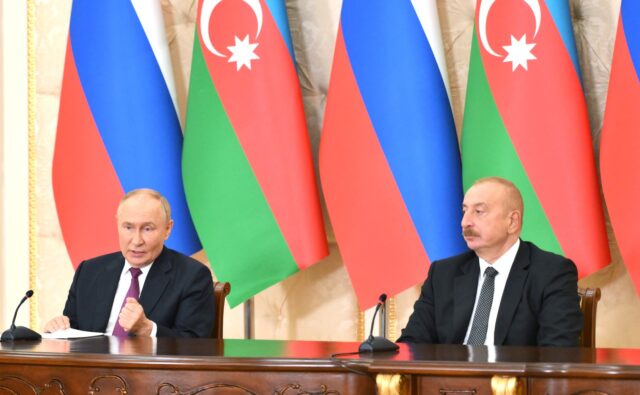
Azerbaijan–Russia Relations Continue to Deteriorate
Publication: Eurasia Daily Monitor Volume: 22 Issue:
By:

Executive Summary:
- Relations between Russia and Azerbaijan have degenerated over the past several months, but until recently, the two countries aimed to keep the crisis under control.
- Moscow’s aggressive rhetoric regarding Baku has turned into action, including the bombing of Azerbaijani oil depots in Ukraine.
- The Kremlin is trying to preserve its influence in the South Caucasus through force or threat, but has only managed to win insignificant concessions so far, losing its leverage over the region in the process.
Relations between Russia and Azerbaijan have deteriorated sharply over the past several months (see EDM, July 7, 22). At the end of June, large-scale arrests of members of the Azerbaijani diaspora in Yekaterinburg related to long-standing criminal cases left two people dead (Deutsche Welle–Russian Service, July 3). In response, the Azerbaijani authorities conducted searches in the office of the Sputnik-Azerbaijan agency in Baku, where they arrested two employees, reporting that they were Russian Federal Security Service (FSB) agents under cover (Deutsche Welle–Russian Service, June 30). Soon afterwards, internet technology (IT) specialists with no formal connection to Russian authorities were detained in Azerbaijan (Deutsche Welle–Russian Service, July 4).
The Main Directorate of Intelligence of the Ukrainian Ministry of Defense (HUR) declared that Russia is widening its military presence in Armenia due to worsening relations with Azerbaijan (NV.ua, July 4). Later, the Berlin Carnegie Center suggested that the conflict was under control and would not escalate to armed confrontation. The Center’s authors noted that against the backdrop of Moscow’s war against Ukraine, Azerbaijan became an important logistical partner for Russia. In their words, from the beginning of the full-scale invasion, Moscow has actively invested in Azerbaijan’s transport infrastructure and projects for Russia-Iran-India routes (see EDM, June 7, 2023, September 6, 2024, February 6; Carnegie Politika, July 4). Consequently, Azerbaijani President Ilham Aliyev appears to be remaining somewhat cautious, likely to ensure the conflict does not escalate. At the same time, the confrontation with Moscow may be advantageous for Baku because it permits Azerbaijan to position itself in the West as a reliable partner in the energy sector and distract its own population from the country’s internal problems (Carnegie Politika, July 4).
Russia’s reinforcement of its military presence in Armenia at that time may have been tied to events in Yerevan. At the end of June, Armenian law enforcement officers revealed an attempted state coup prepared by pro-Russian forces (Eurasianet, July 9; see EDM, July 10). In their words, the coup plan was a step-by-step scheme for destabilizing power in Armenia—from creating strike groups to undermining key infrastructure (Deutsche Welle–Russian Service, June 26). Armenian Prime Minister Nikol Pashinyan remained in power and, in mid-August, signed a peace declaration with Azerbaijan mediated by U.S. President Donald Trump —with no Russian participation (see EDM Strategic Snapshot, August 13). The absence of a Russian role in this step of Armenia and Azerbaijan’s peace process demonstrates a concrete diminution of Moscow’s role in the region.
Moscow’s quarrel with Baku has intensified since the Washington summit. The Kremlin began to send unambiguous signals to political scientists loyal to Moscow who have lobbied for Azerbaijan’s interests, or have simply spoken positively about Aliyev. For example, the Kremlin deemed pro-government political scientist Sergey Markov, who swears his absolute loyalty to Russian President Vladimir Putin, a “foreign agent” (Radio Svoboda, August 23). Telegram channels connected to the Russian presidential administration propose a different version of Markov’s fall from grace, linking it to the struggle between the “Kremlin towers.” Namely, this involves the clan of Sergey Naryshkin and Sergey Kiriyenko, who are patrons of Markov, with Deputy Chief of the Presidential Administration Aleksey Gromov (Telegram/RussicaRU, August 23). Markov’s status as a “foreign agent,” however, was not the only signal that there will be no improvements in relations with Baku in the near future.
Pro-regime political scientist Yevgeniy Krutikov declared that “no one is talking about a warming of relations [with Azerbaijan] in the near future,” and even in the long term, relations with Baku will be “less than friendly” (Sputnik Armenia, August 26). The Russian bombing of Azerbaijani oil depots in Ukraine supports this claim. On August 18, Russian drones struck a State Oil Company of the Azerbaijan Republic (SOCAR) oil depot near Odesa. According to media reports, 17 storage tanks were destroyed (Currenttime.tv, August 18). Moscow later struck the Kremenchuk oil refinery in the Poltava region, causing a massive fire that engulfed the industrial zone. Pro-Kremlin military analysts called the strikes a “hint” to Aliyev, but feared that he would not get the message and had already definitively chosen Ukraine’s side (Topwar.ru, August 23).
Aliyev threatened to begin supplying weapons to Ukraine due to the Russian strikes on SOCAR properties in the Odesa region (President of Azerbaijan; The Moscow Times, August 10). In the meantime, Baku, together with the United States, is creating an investment platform to finance strategic projects in the South Caucasus region, which will make Azerbaijan even more independent of Russia (RIA Novosti, August 26). There is an impression that, apart from bombing Azerbaijani oil depots in Ukraine and declaring its own loyalist political scientists to be foreign agents, Moscow has no response to Aliyev’s actions.
Given worsening relations with Baku, Moscow appears determined to strengthen its position in Armenia. On this front, however, Moscow has managed only insignificant progress. For example, beginning in September, Armenia and Russia will start an automatic exchange of financial information, as a result of which data on Russians’ assets in bank and brokerage accounts will become available to the Russian Tax Service (Deutsche Welle–Russian Service, August 25). Despite retaining economic ties, Moscow has no real leverage over the countries of the South Caucasus other than force—be it the threat of a coup or missile strikes. These levers still force the Caucasian states to reckon with the Kremlin, but they can no longer stop the centrifugal forces and flagging Russian influence in the region.



